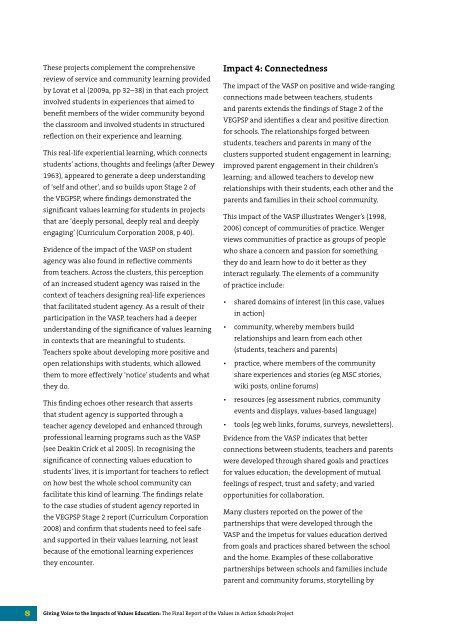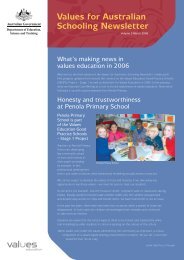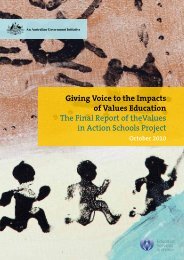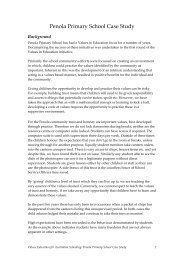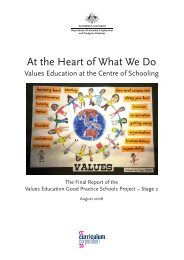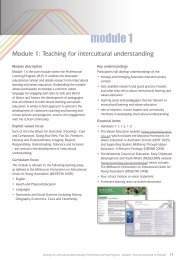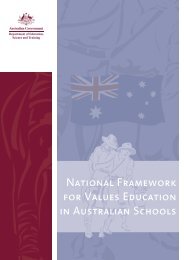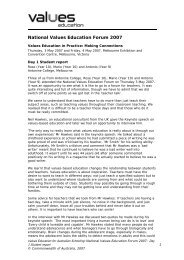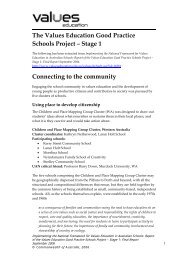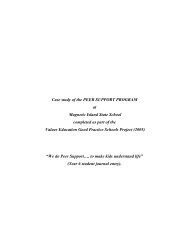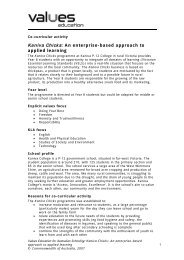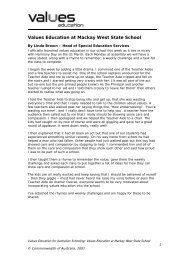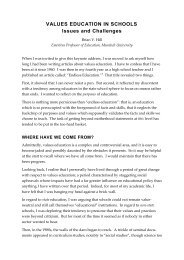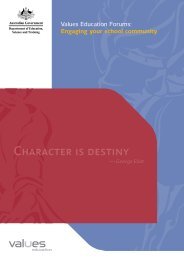Giving Voice to the Impacts of Values Education The Final Report of ...
Giving Voice to the Impacts of Values Education The Final Report of ...
Giving Voice to the Impacts of Values Education The Final Report of ...
You also want an ePaper? Increase the reach of your titles
YUMPU automatically turns print PDFs into web optimized ePapers that Google loves.
<strong>The</strong>se projects complement <strong>the</strong> comprehensive<br />
review <strong>of</strong> service and community learning provided<br />
by Lovat et al (2009a, pp 32–38) in that each project<br />
involved students in experiences that aimed <strong>to</strong><br />
benefit members <strong>of</strong> <strong>the</strong> wider community beyond<br />
<strong>the</strong> classroom and involved students in structured<br />
reflection on <strong>the</strong>ir experience and learning.<br />
This real-life experiential learning, which connects<br />
students’ actions, thoughts and feelings (after Dewey<br />
1963), appeared <strong>to</strong> generate a deep understanding<br />
<strong>of</strong> ‘self and o<strong>the</strong>r’, and so builds upon Stage 2 <strong>of</strong><br />
<strong>the</strong> VEGPSP, where findings demonstrated <strong>the</strong><br />
significant values learning for students in projects<br />
that are ‘deeply personal, deeply real and deeply<br />
engaging’ (Curriculum Corporation 2008, p 40).<br />
Evidence <strong>of</strong> <strong>the</strong> impact <strong>of</strong> <strong>the</strong> VASP on student<br />
agency was also found in reflective comments<br />
from teachers. Across <strong>the</strong> clusters, this perception<br />
<strong>of</strong> an increased student agency was raised in <strong>the</strong><br />
context <strong>of</strong> teachers designing real-life experiences<br />
that facilitated student agency. As a result <strong>of</strong> <strong>the</strong>ir<br />
participation in <strong>the</strong> VASP, teachers had a deeper<br />
understanding <strong>of</strong> <strong>the</strong> significance <strong>of</strong> values learning<br />
in contexts that are meaningful <strong>to</strong> students.<br />
Teachers spoke about developing more positive and<br />
open relationships with students, which allowed<br />
<strong>the</strong>m <strong>to</strong> more effectively ‘notice’ students and what<br />
<strong>the</strong>y do.<br />
This finding echoes o<strong>the</strong>r research that asserts<br />
that student agency is supported through a<br />
teacher agency developed and enhanced through<br />
pr<strong>of</strong>essional learning programs such as <strong>the</strong> VASP<br />
(see Deakin Crick et al 2005). In recognising <strong>the</strong><br />
significance <strong>of</strong> connecting values education <strong>to</strong><br />
students’ lives, it is important for teachers <strong>to</strong> reflect<br />
on how best <strong>the</strong> whole school community can<br />
facilitate this kind <strong>of</strong> learning. <strong>The</strong> findings relate<br />
<strong>to</strong> <strong>the</strong> case studies <strong>of</strong> student agency reported in<br />
<strong>the</strong> VEGPSP Stage 2 report (Curriculum Corporation<br />
2008) and confirm that students need <strong>to</strong> feel safe<br />
and supported in <strong>the</strong>ir values learning, not least<br />
because <strong>of</strong> <strong>the</strong> emotional learning experiences<br />
<strong>the</strong>y encounter.<br />
Impact 4: Connectedness<br />
<strong>The</strong> impact <strong>of</strong> <strong>the</strong> VASP on positive and wide-ranging<br />
connections made between teachers, students<br />
and parents extends <strong>the</strong> findings <strong>of</strong> Stage 2 <strong>of</strong> <strong>the</strong><br />
VEGPSP and identifies a clear and positive direction<br />
for schools. <strong>The</strong> relationships forged between<br />
students, teachers and parents in many <strong>of</strong> <strong>the</strong><br />
clusters supported student engagement in learning;<br />
improved parent engagement in <strong>the</strong>ir children’s<br />
learning; and allowed teachers <strong>to</strong> develop new<br />
relationships with <strong>the</strong>ir students, each o<strong>the</strong>r and <strong>the</strong><br />
parents and families in <strong>the</strong>ir school community.<br />
This impact <strong>of</strong> <strong>the</strong> VASP illustrates Wenger’s (1998,<br />
2006) concept <strong>of</strong> communities <strong>of</strong> practice. Wenger<br />
views communities <strong>of</strong> practice as groups <strong>of</strong> people<br />
who share a concern and passion for something<br />
<strong>the</strong>y do and learn how <strong>to</strong> do it better as <strong>the</strong>y<br />
interact regularly. <strong>The</strong> elements <strong>of</strong> a community<br />
<strong>of</strong> practice include:<br />
• shared domains <strong>of</strong> interest (in this case, values<br />
in action)<br />
• community, whereby members build<br />
relationships and learn from each o<strong>the</strong>r<br />
(students, teachers and parents)<br />
• practice, where members <strong>of</strong> <strong>the</strong> community<br />
share experiences and s<strong>to</strong>ries (eg MSC s<strong>to</strong>ries,<br />
wiki posts, online forums)<br />
• resources (eg assessment rubrics, community<br />
events and displays, values-based language)<br />
• <strong>to</strong>ols (eg web links, forums, surveys, newsletters).<br />
Evidence from <strong>the</strong> VASP indicates that better<br />
connections between students, teachers and parents<br />
were developed through shared goals and practices<br />
for values education; <strong>the</strong> development <strong>of</strong> mutual<br />
feelings <strong>of</strong> respect, trust and safety; and varied<br />
opportunities for collaboration.<br />
Many clusters reported on <strong>the</strong> power <strong>of</strong> <strong>the</strong><br />
partnerships that were developed through <strong>the</strong><br />
VASP and <strong>the</strong> impetus for values education derived<br />
from goals and practices shared between <strong>the</strong> school<br />
and <strong>the</strong> home. Examples <strong>of</strong> <strong>the</strong>se collaborative<br />
partnerships between schools and families include<br />
parent and community forums, s<strong>to</strong>rytelling by<br />
8 <strong>Giving</strong> <strong>Voice</strong> <strong>to</strong> <strong>the</strong> <strong>Impacts</strong> <strong>of</strong> <strong>Values</strong> <strong>Education</strong>: <strong>The</strong> <strong>Final</strong> <strong>Report</strong> <strong>of</strong> <strong>the</strong> <strong>Values</strong> in Action Schools Project


